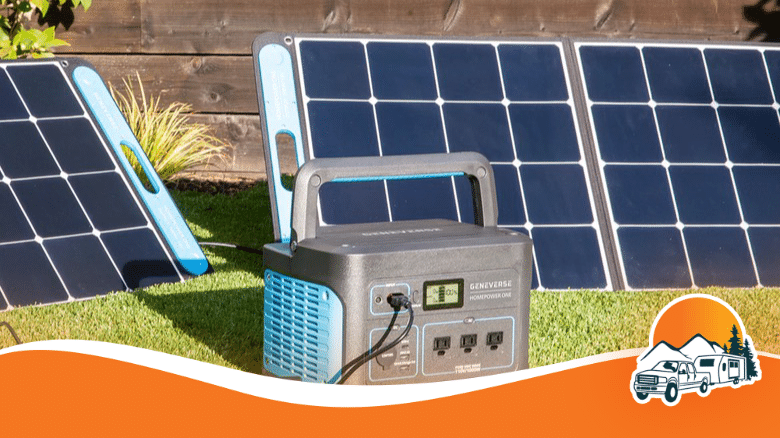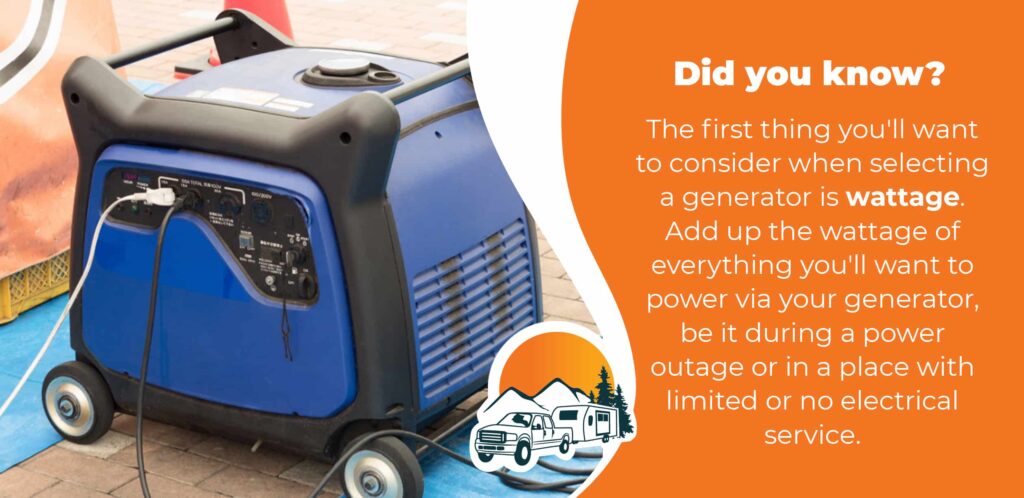Have you finally decided to install a generator as a backup power source as a safety measure? Good for you! However, you must be wondering whether a solar or a gas generator is the right way to go.

Both generators are excellent energy backup resources and provide many benefits. But which one is the right one for you? Let’s find out!
How Does a Solar Generator Work?
For starters, solar generators are powered directly by sunlight. Therefore, they prove to be highly efficient in producing electrical energy.
The primary mechanism through which a solar generator works is the conversion of light energy into electrical energy. To do that, it deploys the usage of a charge controller and lithium batteries.
The solar panel converts the sunlight into direct current (DC) electricity which then moves toward the charge controller. The charge controller’s primary function is to convert this direct current into the stored form of electricity within the lithium batteries.
The inductor in the lithium batteries converts the stored electricity into alternating current (AC) whenever required to power the devices.
How Does a Gas Generator Work?
Gas is a fossil fuel and a natural resource that can be burned to produce electricity.
This applies to all gas generators, whether they are designed for a 30-amp or 50-amp electrical system.
The primary mechanism for the functionality of a gas generator is the heat produced through the burning of natural gas. This heat is then used to generate the mechanical force that eventually induces the current generation.
The current is generated by the spinning of the engine shaft that rotates an armature. The rotation of this electromagnet (armature) induces the generation of current through copper wiring revolving around the shaft.
The electrical energy is collected in the commutator. It is then sent out through the brush assembly. Both the commutator and brush assembly are integral parts of a gas generator.

Solar Generators vs Gas Generators — The Differences
While both generators are popular power solutions, there are a few significant differences that can influence your buying decision.
Price
For solar generators, there is a wide range of generators available at variable prices ranging from $100 to thousands of dollars.
For high-capacity solar generators, the prices range from $1000-$1500 or higher. For low-capacity generators, the fees range from $100-$500.
Another factor to note is that with the increasing capacity of these generators, they can power larger devices such as a refrigerator or air conditioners.
Gas-powered generators are affordable and range from $500 to $3000. One feature worth mentioning of gas-powered generators is that they are portable.
Due to that, their smaller versions may be used in various places because of the wide availability of natural gas in almost any region.
Gas generators are much more cost-effective than solar generators of the same capacity. This is true because they do not require expensive machinery and are easy to use.
However, gas generators tend to wear out more quickly than solar generators and may not prove to be an effective long-term backup option.
Moreover, gas generators require constant maintenance and cleaning every year, which doesn’t seem ideal compared to solar generators.
Pollution
Gas-powered generators are not a good option when considering environmental pollution concerns. Besides creating noise pollution, they also contribute significantly to air pollution.
Gas generators operate on the burning of natural gas. That results in the emission of harmful gases such as carbon monoxide, which is highly toxic for living organisms.
Solar power generators do not create pollution, which is one of its many best features.
The solar generators do not involve the usage of any chemical reaction that may result in the emission of harmful gases. Instead, it directly converts the solar energy into the current.
Thus, it proves to be the best choice to consider when thinking about the pollution a generator ends up causing.
Reliability
One great feature of a solar generator is that it is self-sustaining and reliable. Since it depends on the availability of sunlight, it keeps recharging on its own, and you don’t have to provide it with any fuel or maintain it.
A solar generator makes for an environment-friendly device. It works efficiently because it charges throughout the day, and stored energy can be used at night to power your other devices.
Gas generators, on the other hand, are not reliable for long-term usage. What’s more, they are also high maintenance.
Another factor to be mindful of is that fuel, i.e. natural gas for gas generators, may not be available at times, and you won’t be able to power them up.
Ease of Use
Both the generators are easy to use, but at the end of the day, it all counts on how much effort is required from your side.
A portable gas generator is easy to carry around. On the other hand, the solar generator is fixed, and its effectiveness entirely depends on the sunlight and its conversion to electrical energy.
Hence, a solar generator doesn’t require any external interference. Moreover, it is not limited by other factors such as fuel resources or mechanical friction generally produced in gas generators.
Fuel Costs
A solar generator has zero fuel costs simply because it doesn’t require the usage of natural gas and uses sunlight as the primary source of energy to convert into electricity.
On the other hand, a five-gallon gasoline generator requires approximately 0.75 gallons of fuel per hour.
This fuel needs to be constantly replenished for the proper functionality of the gas generator. That means a gas generator would require around $20-$40 during a power outage.
As you can see, in terms of fuel cost, solar generators are a much better option than gas generators.
Size
The size of a solar generator depends on the usability and the number of watts the generator is powering up. A small generator of around 1000 watts would power up small appliances like your laptop.
On the contrary, generators between 1000 to 3000 watts can power up larger devices such as a microwave or refrigerator.
The gas generators also have varying sizes, but their sizing criteria are more stringent and require the application of formulas that we’re not going to get into.
However, you should know that their capacity ranges from 5KW to 50KW to power up general home appliances.
The capacity of its supply determines the size of a generator, and both these types of generators have a variety of sizes. Depending on what use you require from these generators, you can check out their sizes and make an informed decision.
Power Source
Whenever we talk about solar generators, the power source is always the sunlight. Even though that is one great way to produce energy, it has its limitations.
A solar generator entirely depends on the weather for its usability. It might not be as helpful during monsoon seasons or other days when the sun decides to hide away in the clouds.
Moreover, the solar generator doesn’t always work during the daytime since it’s usually storing electrical energy during the day to power through at nighttime.
A gas generator, on the other hand, depends on gas availability. You can power your gas generator for as long as possible because it is not limited by other factors that are out of your control.
Solar Generator vs Gas Generator — The Verdict
When making the final decision about your generator, you need to consider factors such as your environment, the gas supply, etc.
A solar generator is fuel independent, allowing you to enjoy electricity without worrying about limiting factors such as fuel unavailability or fuel costs.
Conversely, the gas generator, even though dependent on fuel for its energy, is cheaper, easy to carry around, and can help you on your rainy days (quite literally!).
All in all, both generators are excellent options and have numerous benefits. The only thing you need to do is figure out which is the best option for you.
Are you team solar generators or gas generators? Let us know in the comments below.







